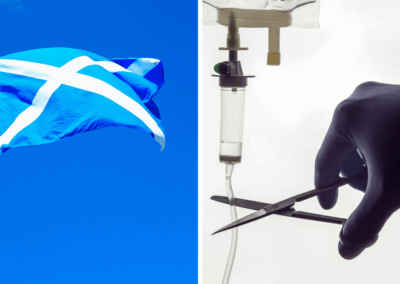A Bill to introduce censorship zones outside abortion clinics in Northern Ireland has been challenged by the attorney general of Northern Ireland on the grounds that it “disproportionately interferes” with the right to protest.
The Abortion Services (Safe Access Zones) (Northern Ireland) Bill was introduced by former Green Party MLA Claire Bailey, who lost her seat in the most recent local elections, and was passed earlier this year. The Bill makes it a criminal offence to “influenc[e]… a… person [seeking an abortion], whether directly or indirectly” within “safe access zones”. In effect, the Bill will criminalise offers of assistance and prayer within 150m of abortion clinics or hospitals where a censorship zone is in place.
However, Dame Brenda King has challenged the Abortion Services (Safe Access Zones) (Northern Ireland) Bill on the grounds that it does not permit a “reasonable excuse” defence.
Reasonable excuse
The counsel for the attorney general’s office, Tony McGleenan QC, said as a result the Bill did not provide a defence for someone who “did not know and had no reasonable way of knowing a protected person was in a safe access zone”.
This omission means that the Bill may be outside of the “legislative competence” of the Northern Ireland Assembly.
Mr McGleenan argued that the current legislation breaches the European Convention on Human Rights (ECHR), specifically in relation to the articles on freedom of religion and expression. He also suggested a “political stance” had been taken by some parties at Stormont when they voted to reject an amendment around “reasonable excuse”.
Mr McGleenan also noted that, should the Bill need changing, it will not have to start all over again: “We don’t go back to square one with the bill, it doesn’t start again. We go back to the legislative process on a distinct point, the assembly can vote on that point and the matter proceeds from there”.
However, amendments to the Bill and subsequent voting cannot happen until there is a functioning assembly.
Mr McGleenan said the deadlock at Stormont was a “circumstantial matter” and that he hoped the situation could be resolved.
“[This] bill… will shut down options open to women who find themselves in crisis”
Prior to the Bill being voted through in March, Alina Dulgheriu, who was herself scheduled to have an abortion but decided to not go ahead with it after receiving help from pro-life volunteers outside an abortion clinic in London, said:
“The day that I turned up to my abortion appointment, a volunteer outside the clinic gave me a leaflet. It offered the help that I had been searching for. I weighed up the two options I had before me, and I chose motherhood. I chose to accept help to get housing, help to find a job and help to obtain a pram, a cot and nappies. It wasn’t easy. But with the support of the group who had given me that leaflet, I couldn’t be prouder of the life my daughter and I have charted out together”.
“[This] bill, designed to prevent us from hearing about offers of support to continue our pregnancies, will shut down options open to women who find themselves in crisis. Such legislation would have been detrimental to the course of my life”.
Right To Life UK spokesperson, Catherine Robinson, said: “The omission of a ‘reasonable excuse’ is a serious problem with an already draconian piece of legislation. It is bad enough to punish people by law for offering alternatives to abortion outside abortion clinics, but it is an added injustice to punish someone who had no knowledge or even no way of knowing that a censorship zone was in place in the first instance”.












